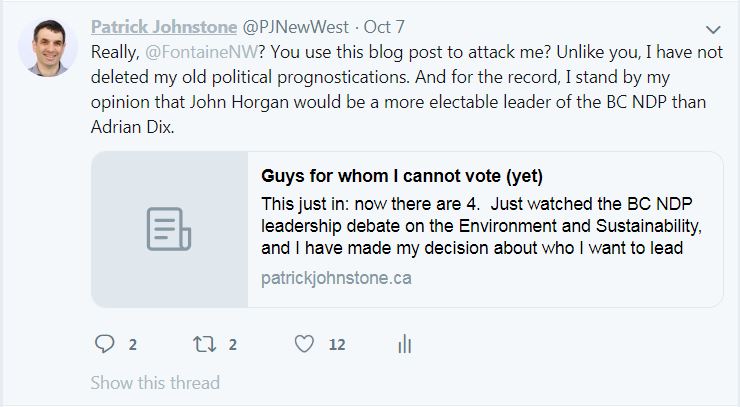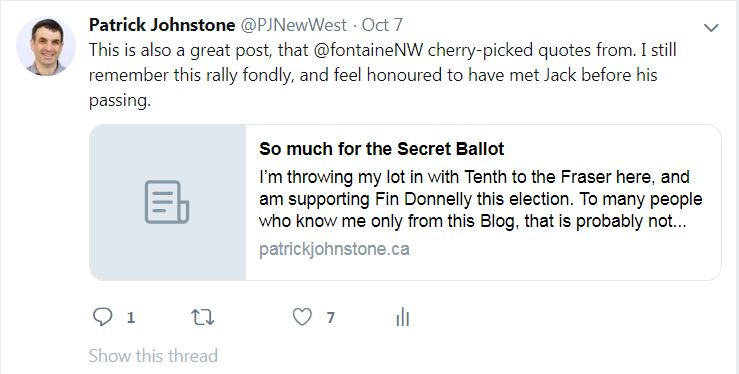I have gone through the numbers of the recent election in a couple of posts, (here, here, and here) but I did so recognizing that I was perpetuating a trope that plagues democracy in North America (and perhaps the world?) – looking at politics like it is just another a sport. Line scores and a zero-sum-game of winners and losers are the easiest and laziest way to report on elections. It leaves little room for the more important discussions we should be having during an election: the debate of ideas and values and visions for the future.
I need to say that this has been a difficult blog post to write. There are a couple of 1,500-word drafts that have been deleted, because they all fell into the mode of being an us-vs-them analysis, and were more critical than helpful. I spent most of the last three months biting my (digital) tongue and not reacting to the messages of those who would have rather they be elected than me, because I wanted to avoid being drawn into a useless spat everyone would regret. It would serve no purpose (other than a little personal catharsis) to go there now.
**That said, I feel the need to stick one of my regular caveats here where I say all of this is my opinion, not the opinion of my council or election colleagues, City Council, the City, or any rational person or organization. If you disagree with me, let me know!**
This slipped once during the campaign when I made a reference to Daniel Fontaine, in reaction to a pretty ham-fisted attempt on his part to demean me on his blog, using what I think was an appropriate amount of dismissive humour, but then following to point out how disingenuous the hit piece was:




Trust me, the hardest part for me this election was not reacting to opponents on-line. There were many drafted-then-deleted tweets. Maybe I’m growing up.
But what was this election about? Other cities had clear narratives (Surrey wanted someone to deal with crime, Burnaby was about the need for housing, Port Moody about slowing the pace of development), but what was the New Westminster election theme?
After the fact and looking at the numbers, it is easiest for me to take the message that voters are generally happy with the way the City is being run, and were not as interested in change as in some of our surrounding communities. This reflected what I heard on the doorstep during three months of doorknocking, and what I heard in a thousand small conversations I had during the election. Things are not perfect, there are definitely things we could do better, but for the most part, things are headed in the right direction, and few are interested in a big shift in direction.
In the end, our main opponents must have heard that as well, and were challenged with messaging “things are mostly OK” along with the “time for a change” idea. In the end, they fell back on the familiar and tired narrative that New Westminster is run by organized labour in a poorly-defined but somehow nefarious way. This is the same narrative that James Crosty used to no success in New West for several elections, and the old Voice New West relied upon. Like running against bike lanes in Vancouver, this campaign message is exciting to a group of people in the City and gets amplified every election by the local media, but has never been one to motivate voters to come out and create a change. New Westminster happily votes for Labour-affiliated and NDP-affiliated candidates enough to elect them, and have done so in increasing numbers in every election for the last decade or two. This is why orange signs were a cynically good idea.
To the credit of my colleagues and voters, the winning candidates never stopped talking about the important issues to New Westminster – housing, transportation, inclusion and accessibility in schools, and livability of our community. They also worked hard to knock on doors and meet people. When I look at the new names at the top of the polls – Nakagawa, Ansari, Beattie, Dhaliwal – these are the candidates I saw out there every day earning votes with shoeleather and ideas. On election-period effort alone they earned every vote they got.
There was one big difference between this election and the previous one – the remarkable shrinking of the media space. Last election there were four (4!) local newspapers a week in New Westminster, now there is one. At the risk of poking those who buy ink by the barrel, there was not a tonne of coverage in the last few weeks of the election in the lone paper standing.
Since Labour Day (when the public starts properly paying attention to the campaign), there were a few news stories that announced the new candidates as they trickled out, a couple of pieces covering NWP messaging around how unfair the entire election process was, and not a lot else. The two substantial pieces were an October 4th quote-mining review of two All-Candidates Meetings (which strangely emphasized May Day as the biggest issue), and a really excellent 2-page spread on October 11th on diversity. However, through the entire election period there were no printed candidate profiles, not a single article discussing housing policy, infrastructure needs, transportation challenges, or any of the other top issues that might have informed voters about contrasts between what different candidates were offering. The final edition before the election (October 18th) had a single opinion piece admonishing people to vote, but no other coverage of the election or issues at hand. I don’t remember being asked a single election-related question by a single reporter between Labour Day and the close of the polls.
I recognize there are limited resources and limited column inches in one edition a week, and there was more material available on-line, but even that discussion was dominated by discussing the process of the election, with paltry discussion of policy issues. The emphasis on click-baity open-question headlines on Twitter and Facebook probably just worsened partisan bickering between supporters instead of actually inform on any issue. Indeed, here is where I missed the old Tomkinson-era Tenth to the Fraser that provided a really strong and well-curated online discussion. I suspect print is still more important to a significant number of voters than on-line content, and I can’t help but feel that the Burnaby Now side of the local Black Press Glacier Media office got a lot more attention, and their election got more column inches. Perhaps their election was more exciting.
So what now? The things I tried to talk about during the election are still my priorities after the election. We need to continue to improve how the City communicates and engages the public, and I want to have a serious talk with the provincial government on reforming the Public Hearing process. We are already leading the region in affordable housing policy, but have no intention of taking our foot off the gas, and will work to get new funding and new policy levers provided by the province (such as Rental Zoning) working for us locally. On transportation, I want to push a conversation forward about changing the culture in our roads. I want us to prioritize making vulnerable road users feel safe at all times. It is time for us to grow up and talk honestly about the goals of our transportation plan, which is not the destructive (and ultimately self-defeating) goal of “getting traffic moving”.
Of course, I am just one of 7 on Council, and finding consensus on strategic plans for the next 4 years will be the main conversation for the next couple of months. Stay tuned!